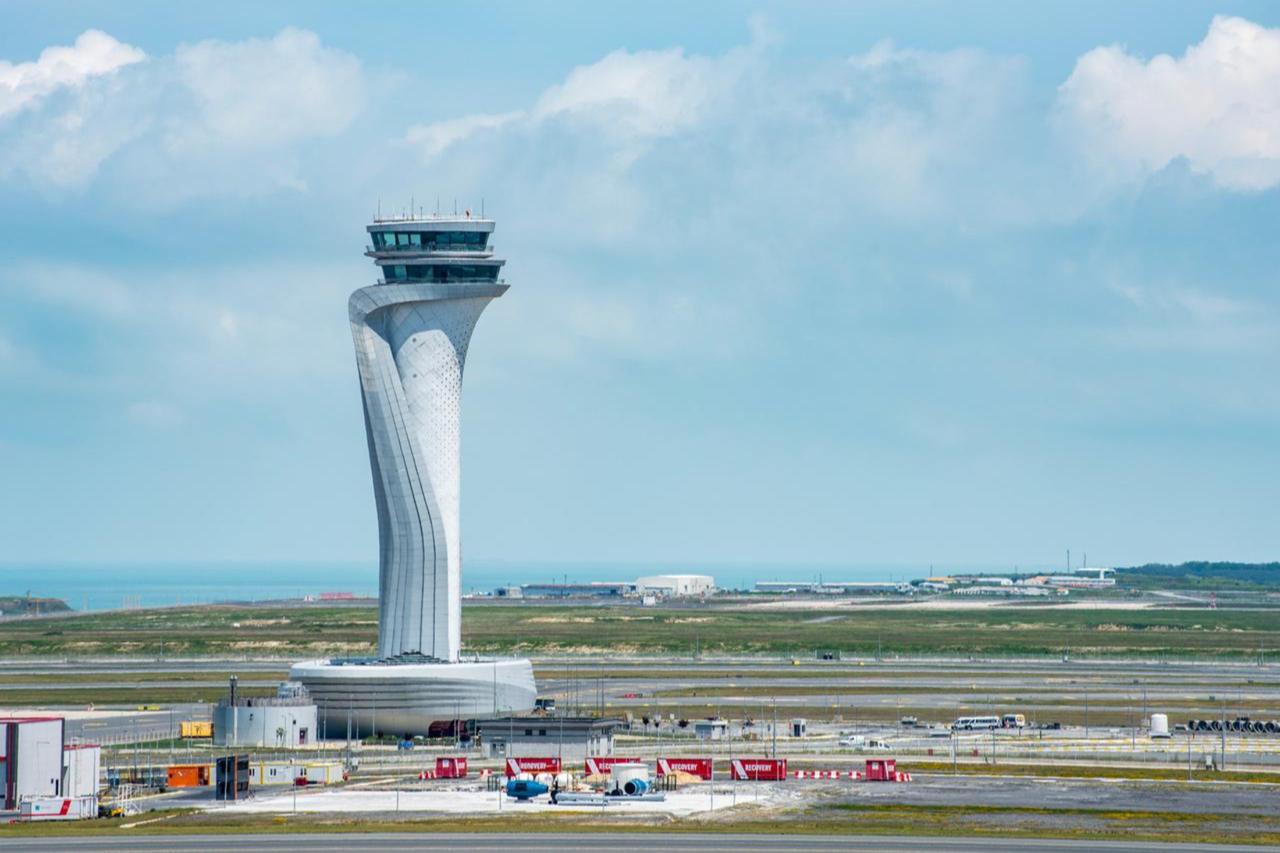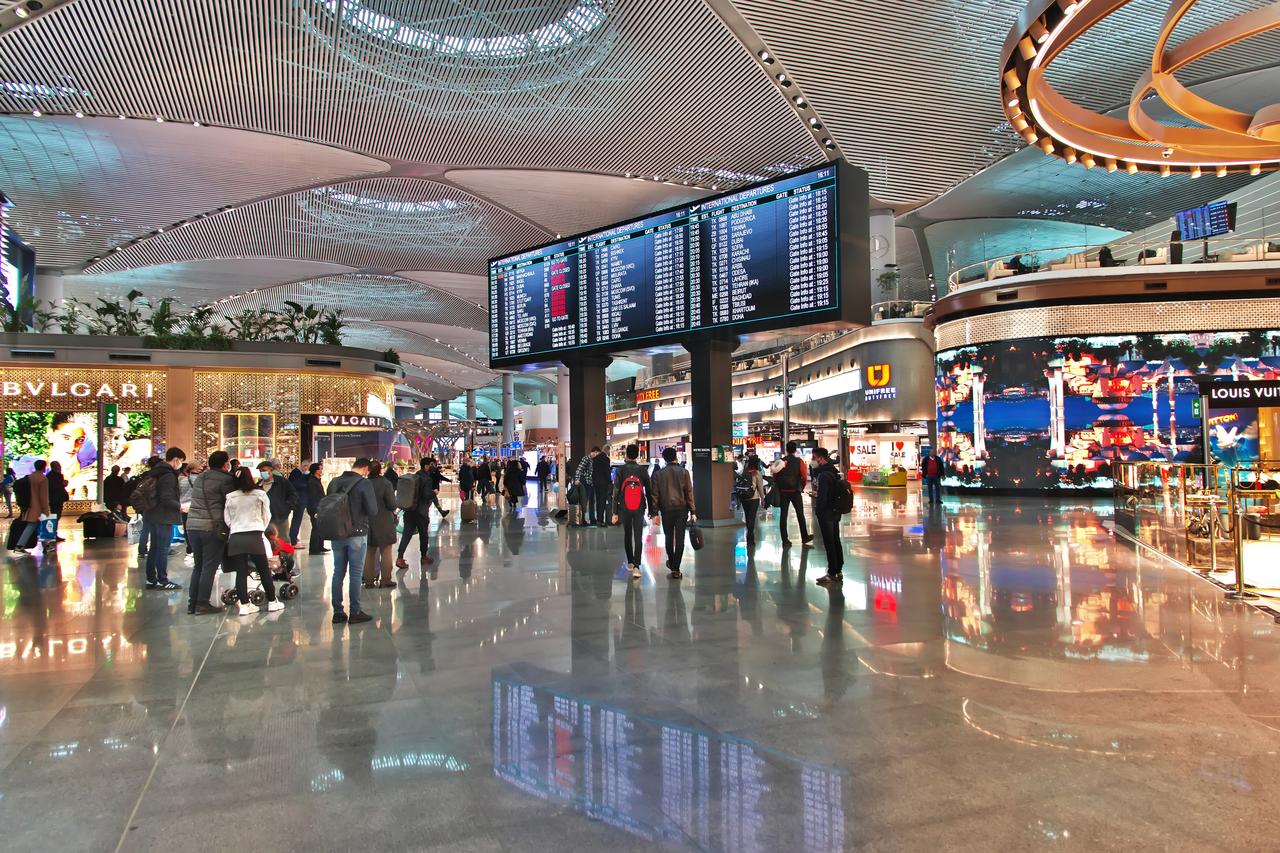Istanbul Airport leads Europe in passenger traffic for June 2025
A scenic view of Istanbul Airport, the worlds third-largest airport, featuring its iconic air traffic control tower in Istanbul, Türkiye. (Adobe Stock Photo)
July 12, 2025 04:34 PM GMT+03:00
Istanbul Airport has taken the mantle as the busiest airport in Europe in June 2025, with an average of 1,591 flights a day throughout the week of June 9 -15.
This number puts the airport in the lead in terms of the number of flights flown over Amsterdam, Paris CDG, Frankfurt and Heathrow in Europe, according to the Eurocontrol report, released mid-June.
The same month, the 2025 Connectivity Report released by ACI Europe validated this position as the most connected airport in Europe in terms of both hub and direct flights reached. Total connectivity in the city grew 59% since 2019 and nonstop flights increased 13%, overtaking pandemic past levels.
Istanbul Airport’s growth powered by advanced Turkish Airlines plan
Two key pillars underpin Istanbul Airport's success: Turkish Airlines’ rapid expansion and the airport’s robust infrastructure. Turkish Airlines now serves 352 international destinations across 131 countries, operating a fleet of 492 aircraft, after a 12% fleet growth in 2024. The airline made a net profit of $2.4 billion, transporting nearly 85 million passengers, which places Istanbul Airport at a long-haul and connecting supremacy.
Other vital factors are the modern terminal complex and operational capacity. This has enabled the airport to run three sets of runways at the same time, which facilitates flight capacity and also flight efficiency, which is an asset that not many European counterparts will be able to match. In 2024, the airport handled more than 80 million passengers, outflanking a number of major European hubs.
Turkish Airlines aircraft lined up at their gates at Istanbul Airport in Türkiye, on October 8, 2023. (Adobe Stock Photo)
How travelers can benefit from layover services at Istanbul Airport
As Istanbul Airport climbs in global rankings, travelers can enjoy unique perks through Turkish Airlines’ stopover programs:
- Stopover hotel offers: Transit passengers with layovers over 20 hours may be eligible for complimentary accommodation. Economy-class travelers are entitled to one or two nights in a four-star hotel, depending on their departure country, while business-class flyers can receive two to three nights in a five-star hotel. To qualify, guests must email Turkish Airlines' stopover desk at least 72 hours before departure, citing their booking reference and desired services
- Touristanbul free city tours: Passengers with layovers between six and 24 hours can join Touristanbul, a guided tour covering landmarks like the Blue Mosque, Hagia Sophia, and Grand Bazaar. Services include transportation, guided visits, meals, and museum entry. Registration is available at Istanbul Airport’s Touristanbul desk and must align with airline schedules.
- YOTEL transit accommodation: The airport houses an airside YOTEL offering hourly cabin bookings. Eligible passengers—business class (9+ hour layovers) and economy (12+ hours)—can reserve a free night through the stopover email service.
Practical steps for travelers:
- Confirm eligibility by booking a Turkish Airlines ticket with a layover at Istanbul Airport.
- Email the stopover team at least 72 hours before departure.
- Bring your passport, boarding pass, and vouchers for services.
- Plan transfers and visa arrangements independently.
- Allocate time for hotel stays, tours, or rest based on your layover.
Travelers browse luxury shops and check flight information in the international departures hall at Istanbul Airport in Türkiye on March 20, 2021. (Adobe Stock Photo)
Implications for Türkiye and global aviation community
IST's ranking surge impacts aviation, tourism, and trade:
- Passenger growth and infrastructure: With more than 80 million passengers handled in 2024 and nearly 1,600 flights daily, the airport has steered clear of pre-2019 slump trends that still affect many EU airports. Eight airports in the top 10 recorded fewer flights than 2019, but the airport notably exceeded its past volume by 22%.
- Tourism and economic development: Istanbul welcomed 9.5 million foreign tourists between January and May 2025, showing resilience in tourism amid global challenges. This uptick, along with the city’s role as a global transit hub, contributes significantly to the hospitality and service industries.
- Strategic air connectivity: The airport’s expanding long-haul flight capacity supports cargo infrastructure, and Turkish Cargo ranks among the top five global carriers. The airport is poised to play an increasingly central role in logistics and international commerce, with planned terminal and runway expansions expected to further improve efficiency.
The journey of Istanbul Airport to become the busiest and most connected hub in Europe is an indication of strategic planning, strong partnerships and even investments in the infrastructure. Other major stopover incentives are free hotels and guided tours by IST, which means instead of sitting in an airport hub waiting to be transferred, customers can experience the city of Istanbul at zero cost.
As summer 2025 continues, Istanbul Airport is no longer purely an air traffic hub; it is transforming into an affordable tourist destination in its own right. Trying to establish itself at the crossroads between the continents, the role of Istanbul Airport is growing around the globe, thus a part of the aviation potential of Türkiye, it also indicates its strategic importance in the exchange between the East and the West.
As Istanbul Airport continues to invest in passenger services, environmental sustainability, and regional partnerships, the stages up ahead point to a new phase of global transport, one in which Türkiye is not just a layover, but the beating heart of the future of global air travel.
July 12, 2025 05:05 PM GMT+03:00


